Chico State Honors Diversity and Inclusion on Campus
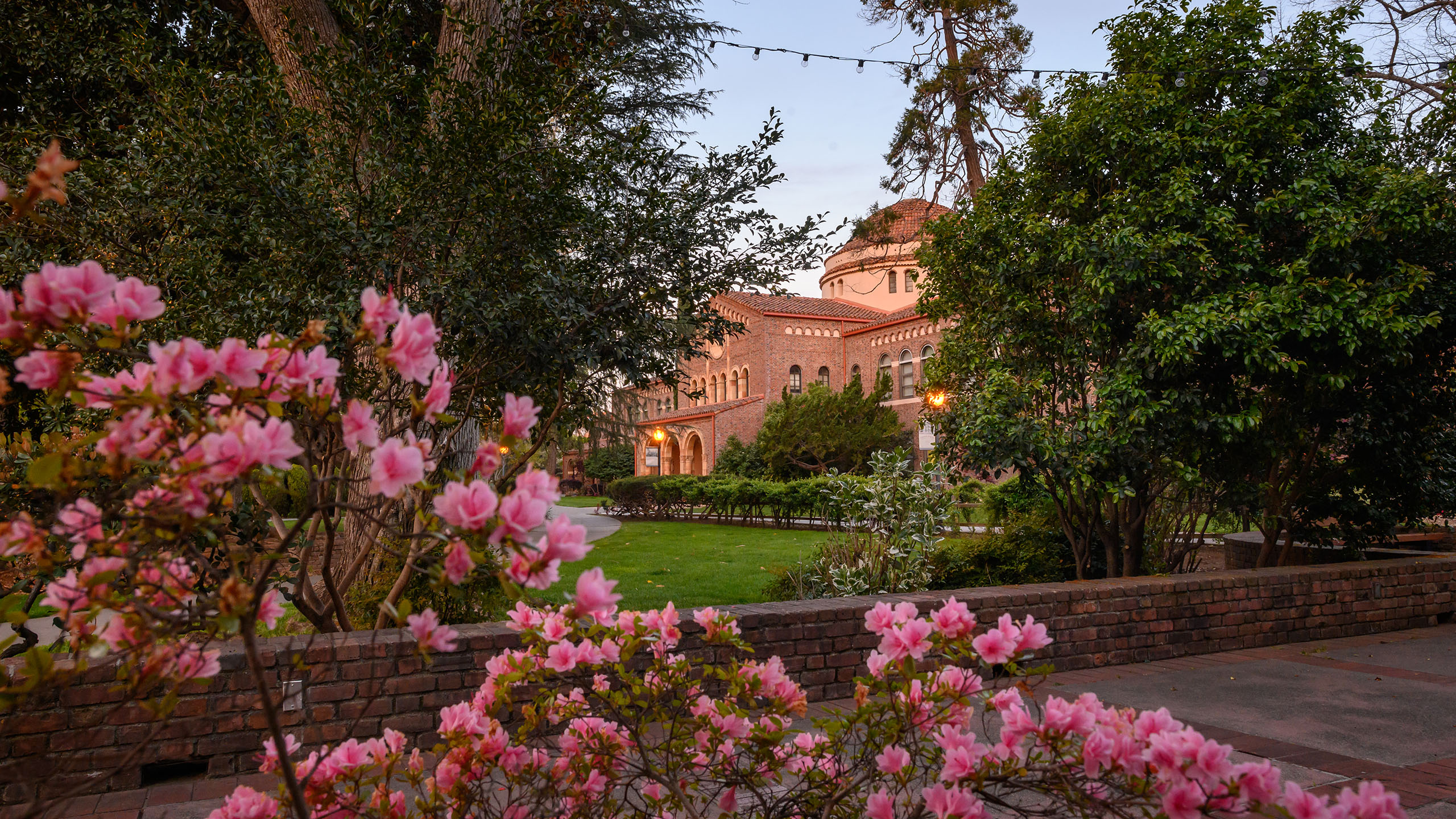
An early morning view of the Kendall Hall on Friday, March 27, 2020 in Chico, Calif. (Jason Halley/University Photographer/CSU, Chico)
They highlight inequities and work to overturn them. They strive to ensure students’ basic needs are met. They fight for social justice.
With Chico State’s deep commitment to equity, diversity, inclusion, the University is filled with champions who lead transformational programs, guide day-to-day efforts, and continue to push for improvement. In May, nine were honored for their contributions and dedication during the 13th annual Conversations on Diversity and Inclusion Awards.
Faculty and staff have long hosted a series of discussions that focus on the complexities of group and individual identities. These Conversations on Diversity and Inclusion (CODI) aim to expose and treat the various ills reflected on our campus and in our community—xenophobia, homophobia, racism, sexism, classism, ignorance, apathy, etc.—as well as celebrate our differences in hopes of bringing about enlightenment, understanding, and acceptance.
Every spring, the CODI planning committee, the Office of Diversity and Inclusion, the Department of Multicultural and Gender Studies, and the Gender and Sexuality Equity Coalition honor those who exemplify the ideals of the series. This year, the awards ceremony was held virtually due to COVID-19, but it was still filled with an outpouring of support and praise for the University’s diversity champions.
Meet this year’s recipients:
Behind the Scenes
Katy Sylvia, Political Science and Criminal Justice
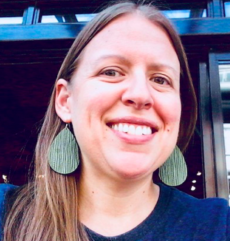
Many never realize how much work goes into organizing an event like the Department of Political Science and Criminal Justice’s Town Hall meeting—but Katy Sylvia does. In fact, her exceptional organizational leadership is the reason the recurring event runs as smoothly as it does every semester.
The Town Hall meeting is meant to connect students with experts and facilitators in the political science and criminal justice fields to get authoritative input on topics they have been writing about throughout the semester. It is a crucial pedogeological component that helps students visualize policy points to complete their final projects, said presenter and graduate student Edward Berdan, and also “brings to light many issues affecting underrepresented communities like poverty, climate change, police brutality, and even food insecurity.” The planning and organization of an event of this magnitude is a massive undertaking, but Sylvia (Religious Studies, ’07; MA, Political Science, ’14) has tackled it head on and without hesitation since spring 2018.
“This event requires a semester-long collaboration between faculty and administration to find adequate space to host the hundreds of students participating in the event, and with students themselves and guiding them through this long but necessary process. Katy Sylvia has been that steady worker behind the curtain,” Berdan said.
The Behind the Scenes Award is meant to shine the spotlight on those who would generally work unnoticed. Its description reads, “Just as in a movie or in theatre, much of the diversity efforts, the real work, is conducted and maintained behind the scenes, out of public view. This award honors the individual behind the scenes, working diligently and often without recognition to ensure that the show goes on seamlessly and successfully.” And Sylvia certainly fits the bill.
“Because of the seamless occurrence of the Town Hall due to Katy Sylvia’s organizational leadership, many students have a renewed interest in our public policy-making process. Such leadership is even more impressive, as she is a lecturer balancing the need to organize this event alongside her teaching obligations,” Berdan said.
Promising Newcomer
Browning Neddeau, Multicultural and Gender Studies; School of Education
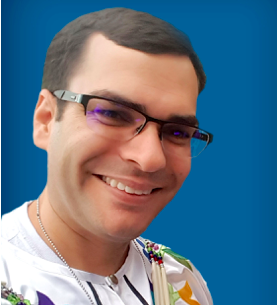
Since arriving on campus in fall 2019 Browning Neddeau has made an immense impression on his fellow faculty, his students, and staff who see him in the halls of the Department of Multicultural and Gender Studies (MCGS) and the School of Education.
“Neddeau came to campus full of ideas, energy, and passion for teaching inclusively and achieving equity for underserved and minoritized students, faculty, and staff,” said MCGS Chair Sara Cooper, Director of Tribal Relations Rachel McBride, Director of the School of Education Rebecca Justeson, and School of Education faculty member Paula Selvester in a joint nomination statement.
The Promising Newcomer Award “is presented to an individual whose fresh perspective and energy galvanize campus diversity work and facilitate new approaches to old problems. The award honors the newcomer’s vision and invites a sustained commitment to its realization.”
Enter Neddeau—who is enrolled in the Citizen Potawatomi Nation—as he is deeply involved in service supporting equity, diversity, and inclusion. He is a Chico State representative at the Ipakanni Early College Charter school, a Native American charter school in Oroville.
Volunteering to serve as part of the MCGS search committee looking for an American Indian studies professor, Neddeau has been invaluable in providing disciplinary expertise as well as taking on much of the supportive work. He also has been an active member of the MCGS curriculum work, supporting new and revised courses centered on equity, diversity, and inclusion.
During the COVID-19 outbreak, Neddeau’s formidable skills helped to move art education courses online, and he is using innovative methods to engage and support students who are sheltering in place.
Teach Back Award
Breanna Holbert, agricultural education major
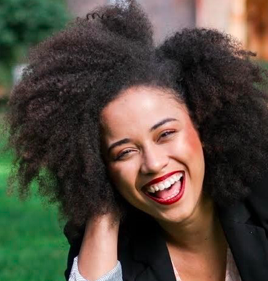
The Teach Back Award “recognizes the fact that while students most often learn from their professors, they also teach their instructors and peers. With this award we honor one of our students who has consistently been active either inside or outside of the classroom and contributed to diversity education on campus,” and presenter and Associate Director of Associated Students Government Katie Peterson said there’s no one else more deserving of the award than Breanna Holbert.
“I have been amazed by her ability to navigate so many environments and spaces to start a conversation around diversity and inclusion,” Peterson said. “In this last year, I have witnessed her navigate multiple spaces trying to find ways to build bridges where divisions have been heavily constructed around differences. At times when others were silent, Bre spoke up and tried to identify ways to make a difference. Bre never avoided stepping into spaces that were uncomfortable or where individuals might hold very different beliefs than her own.”
The agricultural education major and the new Associated Students president has worn many hats since coming to Chico State, including Associate Director of Legislative Affairs and serving a year as the first black female president for the National Future Farmers of America. In her final address, she challenged her peers to redefine what a “farmer” looks like and how to embrace diversity and inclusion within the agricultural community.
“She was able to challenge stereotypes and comfort zones in talking about diversity, which is a topic that many folks try to avoid altogether. Not only did Bre embrace the challenge, she facilitated the conversation with grace and compassion,” Peterson said.
Pulling Us Together
Joe Picard, Basic Needs Project

Neither flood, fire, nor COVID-19 can stop Basic Needs Project administrator Joe Picard. From food to emergency grants to short-term housing, Picard supports the goals of the institution in making Chico State students successful. He brings together the Project’s business partners, farmers, food banks, community agencies, faculty, staff, students, parents, alumni, and generous individual donors for a resulting distribution of more than 35 tons of food and supporting the basic needs of more than 4,000 students.
With a list like that, it’s no wonder Picard won the Pulling Us Together Award. The award is “presented to the organizer(s) of an event that was noteworthy for drawing people together to take a bold step towards social change. The event may involve teaching the campus community eye-opening lessons about diversity issues, galvanizing a response to a particular social justice issue, or representing those who are often marginalized in US society.”
This award couldn’t be more perfect for Joe,” said presenter and Director of Division Human Resources and Budget for Student Affairs Kathleen Moroney. “Talk about pulling people together. The first thing he did was get our students at University Farm involved by introducing a ‘veggie bucks’ program bringing organic produce to our students facing food insecurity. Then, in a stroke of luck and genius, he introduced me to Jenny Breed at the Center for Healthy Communities. CalFresh Outreach became an integral part of assisting our students.”
Picard has captured the heart of many philanthropic groups, such as Salvation Army, Lions Club, Sons of Italy, Soroptimist International, and many churches in the community, Chico Housing Action Team, and the Chico Food Project, to name a few, Moroney added. No one can resist Joe’s passion for students and their well-being, and his boundless enthusiasm to bring everyone together in making Chico State students successful by helping meet their basic needs.
Walk the Line
Annie Adamian, School of Education
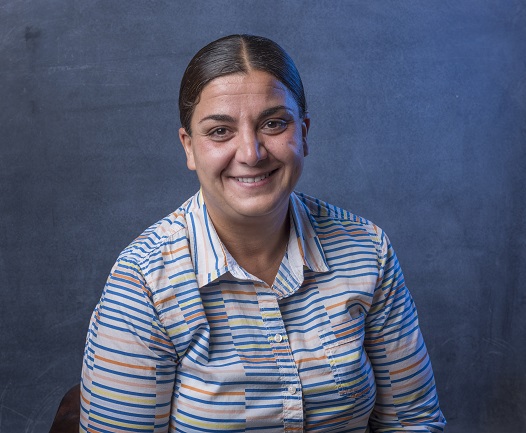
The Walk the Line Award “recognizes that the work to achieve social justice is both demanding and risky. Risks include excessive scrutiny and burn out from juggling multiple roles (e.g., mentor, teacher, advocate). This award recognizes one who takes such risk without the protection of privilege and safety nets such as tenure or secure full-time employment.” School of Education assistant professor Annie Adamian (Geosciences, ’00; MA, Education, ’10) is the epitome of this award.
Over the course of her almost 20-year teaching career, she has become known to be “deeply committed to shining a bright light on inequities, especially racial inequities, in K–16 classrooms and policies, and then using her formidable skills and knowledge to empower others to eliminate these inequities,” said history department faculty member Jason Nice during his presentation speech.
“Her impact on our campus was immediate and palpable,” Nice said of Adamian joining the Chico State family. “In January 2019, I was present when a draft of a resolution regarding equity gaps in student achievement was first discussed in an Academic Senate subcommittee. . . . Annie recognized (rightly) that it needed to be stronger, much stronger, [and] took the lead of a group that revised the draft, and returned it to the Senate committee with a statement acknowledging a Chico State history of ‘systemic white supremacy.’”
As expected, this statement caused a certain degree of consternation, Nice said, but Adamian did not back down, and the Senate subcommittee eventually substituted “systemic white supremacy” with “systemic institutionalized class, race, and ethnic patterns of oppression.” The resolution was approved by the full Academic Senate on April 25, 2019.
“Its strength is Annie’s strength, and we all owe her a huge debt of gratitude,” Nice said.
Taking It to the Streets
Jeremy Olguin, Office of Accessible Technology and Services
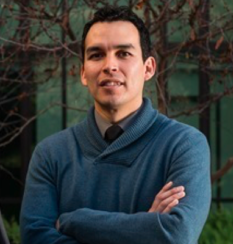
The Taking It to the Streets Award highlights a “group’s or individual’s timely response to an event or issue of local, national, or global significance. We particularly want to honor students, staff, or faculty who have provided a direct service to communities or individuals impacted by the topic.”
Jeremy Olguin (Social Science, ’17), the accessible tech manager in the Office of Accessible Technology and Services, has proved time and time again that he will go above and beyond his duties to provide accessible technology and support across campus.
Olguin’s work has been recognized by the Chancellor’s Office for his innovations in ensuring inclusive and equitable technology practices and universal design. Also, he and his team have been instrumental during this COVID-19 pandemic with transitioning to online and virtual services in sourcing information for the Keep Learning website, geared toward assisting students navigate this new world of online learning.
Also, he has been instrumental in helping to coordinate the campus’s ever-evolving response to online and virtual learning during the shelter-in-place and social distancing orders and continues to send out nearly daily updates on best practices and new support tools for working and learning online.
Presenter and Director of the Student Learning Center Dawn Frank said, “Jeremy first helped mobilize the division of Student Affairs to update our websites with virtual services posted and easily accessible, and then quickly developed an analytics tool to track visits to our websites to ensure our information was getting out there to the campus community. To be even more responsive, he activated Live Agent Chat on the Keep Learning website to immediately help with Learning Technology questions.”
He has worked diligently to providing, technology and equipment including webcams, loaner laptops and mobile hotspots to both students and staff as well as articulating needs around call forwarding and unified voicemail to assist in our virtual work, Frank said.
“Accessibility is a pillar of diversity work, and Jeremy, we thank you for your service to our campus community and all of your assistance in supporting us in this virtual world,” she said.
After Chico Award
Nicole McAllister (Multicultural and Gender Studies, Political Science, Social Science, ’15)
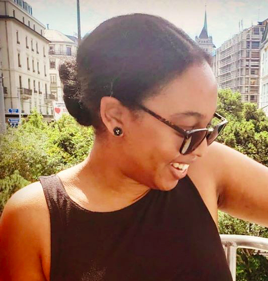
For the past three years, Nicole McCallister has been on staff with the National Prison Rape Elimination Act (PREA) Resource Center in Washington, DC, which was created to implement various facets of an initiative to ensure sexual safety for those in confinement. Advocacy and social justice have long been passions for McCallister, whose early efforts mobilized at Chico State through the Campus Legal Information Clinic and the Gender and Sexuality Equity Center.
At PREA, she is working to change the culture of corrections—and make facilities safer for everyone. Within the last year, she was promoted to program specialist and is in charge of managing the development and implementation of PREA Academy, a nationwide online learning program consisting of several courses for PREA-related education. In her role, she also contributes to the administration of several external funding opportunities with national partner organizations and corrections jurisdictions in an effort to advance their efforts to ensure sexual safety for those in confinement.
McCallister’s accomplishments after graduation are nothing short of noteworthy, and the After Chico Award is “proof that a good education is what you do with what you’ve learned.” However, her accomplishments as a Chico State student are equally impressive and laid a foundation for her national-level advocacy work.
Before she graduated, she participated in the highly selective Congressional Intern Program in Washington, DC, where she conducted legislative research and created memoranda for staff and US Congressman John Garamendi in the areas of veterans affairs, women’s issues, and issues of religious and cultural intolerance. After the student internship, McCallister was persuaded to continue as a legislative and executive assistant for the congressman for almost three years.
“Even though this award celebrates Nicole McCallister’s accomplishments after graduation, I want to [remind] folks of her illustrious Chico State career,” said Sara Cooper, chair of the Department of Multicultural and Gender Studies and award presenter. “She served in three leadership positions with Associated Students and was this campus’s elected board member on the statewide Associated Students.”
McCallister is in the midst of earning her master’s degree in public management at Johns Hopkins University.
Lifetime Achievement Award
Gary McMahon, Student Success Center
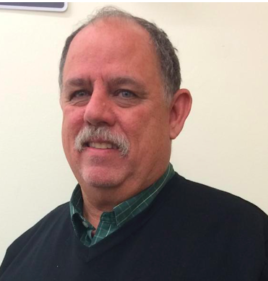
As the founding director of the Student Success Center (CSSC), Gary McMahon’s (Instructional Technology Information and Communication Studies, ’84; MS, Accountancy, ’97) prime goal was to serve first-generation and low-income students from recruitment to graduation and beyond. He and his team have developed partnerships with 46 high schools in California, building relationships with counselors, families, and students for whom college might otherwise never have been imaginable.
Presenter and Dean of Undergraduate Education Kate McCarthy expressed her admiration of McMahon’s and the Center’s dedication to the students they serve.
“These students receive remarkable support, from the REACH first-year peer mentoring program through regular advising, outreach, and support in the form of everything from an open computer lab and snack center to reliable sources of affirmation and accountability,” she said. “Students in the CSSC know that they are valued, that they are capable, and that this University has their back. The wonderful success rates of these students, and the fact that so many of them become supporters of the Center as alumni, is exactly the validation Gary would want.”
While the CSSC didn’t open until 2008, McMahon’s work to uplift underrepresented students—and any student—and help them succeed in the workforce started much earlier. In 1997, he created the College of Business Resource Center, which served as a model for the CSSC and many other student success programs on campus.
Supporters said there is no doubt that McMahon deserved this recognition because the Lifetime Achievement Award is meant to acknowledge that “understanding diversity is the work of a lifetime. Helping others to understand it is the work of an extraordinary lifetime. This award is presented to an individual who has brought the campus closer to its vision of inclusiveness through their cumulative daily efforts to promote understanding and collaboration across lines of gender, race, culture, class, and sexuality.”
“He swears like a sailor and he cries at the drop of a hat. This combination says a great deal about this man, who has remained passionate about fixing the large and small injustices facing those with whom the world has dealt badly. That passion is rooted in the openness and vulnerability that he has maintained in the many years he has devoted to this work,” McCarthy said. “Gary’s lifetime achievement is the humanity he brings to bureaucracy, the authenticity he brings to relationships, and the tireless commitment he brings to doing the right thing, all of which are evidenced in the success of the literally thousands of students who are better for having known him.”
McMahon retired this spring and forbid his friends and coworkers from throwing him a public celebration, and the coronavirus pandemic ensured they didn’t try to surprise him. McCarthy hopes that this award not only honors his worthy achievements but ensures he knows “how much he is loved and will be missed.”
Taking It to the Classroom
Carolina Alvarado, Science Education
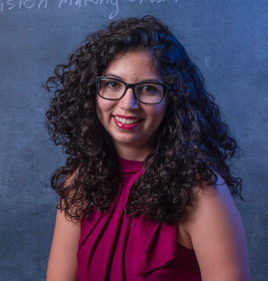
During her interview to join the Chico State science education department faculty in August 2016, Carolina Alvarado made it known that diversity matters would be an unwritten part of her teaching curriculum, and she has since stuck to her word.
“[She] has done so much in just a few years at CSU, Chico,” said award presenter and Dean of the College of Natural Sciences David Hassenzahl. “When she came for her interview, it was immediately clear that she was committed not just to understanding and advancing physics education, but to socially just physics education.”
The Taking It to the Classroom award “recognizes individuals who address diversity issues in the classroom often must deal with sensitive and challenging subjects, resistant or apathetic students, and professional scrutiny. It is a daunting task that many choose not to address. The Taking It to the Classroom award recognizes an outstanding faculty member who possesses the courage and creativity required to successfully engage diversity issues in the classroom.”
“Dr. Alvarado is an asset to our university, and she richly deserves this award,” said Hassenzahl,” [because she] is an excellent and highly productive scholar, a strong educator, and a generous member of our community [who] brings a multicultural perspective to physics education.”
Her notable diversity efforts and activities in and out of the classroom include mentoring numerous students from diverse backgrounds in research and creating opportunities for them to publish and travel to present their work, presenting at the Chico March for Science and bringing a message of optimism delivered in both Spanish and English, and writing successful grant requests to support historically underrepresented members of our student population—to name a few , Hassenzahl said.
Julie Monet, Department of Science Education chair, said that Alvarado “views education as a transformational tool,” and that she invariably “fosters an inclusive, multicultural, and collaborative learning environment.”


